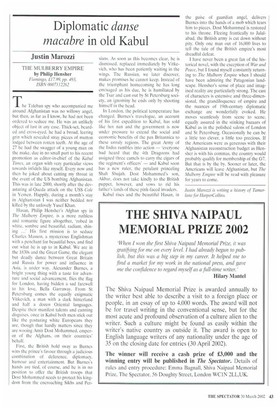Diplomatic danse
macabre in old Kabul
Justin Marozzi
THE MULBERRY EMPIRE by Philip Hensher Flamingo,L17.99, pp. 493, ISBN 0007112262 The Taleban spy who accompanied me around Afghanistan was no willowy angel, but then, as far as I know, he had not been ordered to seduce me. He was an unlikely object of lust in any case. Thick-set, bearded and cross-eyed, he had a broad, leering grin which revealed stray pieces of mutton lodged between rotten teeth. At the age of 27 he had the swagger of a young man on the make, due in no small part to his recent promotion as editor-in-chief of the Kabul Times, an organ with very particular views towards infidels like myself. Every now and then he joked about cutting my throat in the event of the US bombing Afghanistan. This was in late 2000, shortly after the devastating al-Qaeda attack on the USS Cole in Yemen. Happily, during a month's stay in Afghanistan I was neither bedded nor killed by the unlovely Yusef Khan.
Hasan, Philip Hensher's Afghan spy in The Mulberry Empire, is a more ruthless and romantic figure altogether, 'robed in white, sombre and beautiful, radiant, shining .... His first mission is to seduce Charles Masson, a mysterious Englishman with a penchant for beautiful boys, and find out what he is up to in Kabul. We are in the 1830s and the Great Game, the elegant but deadly dance between Great Britain and Russia for power and influence in Asia, is under way. Alexander Burnes, a bright young thing with a taste for adventure and social advancement, flies the flag for London, having bidden a sad farewell to his love, Bella Garraway. From St Petersburg comes the equally enigmatic Vitkevich, a man with a dark hinterland and half a dozen Oriental languages. Despite their manifest talents and cunning disguises, once in Kabul both men stick out like the posturing white Europeans they are, though that hardly matters since they are wooing Amir Dost Mohammed, emperor of the Afghans, on their countries' behalf.
First, the British hold sway as Burnes wins the prince's favour through a judicious combination of deference, diplomacy, humour and entertainment. But Burnes's hands are tied, of course, and he is in no position to offer the British troops that Dost Mohammed needs to protect his kingdom from the encroaching Sikhs and Per
sians. As soon as this becomes clear, he is dismissed, replaced immediately by Vitkevich, who has been patiently waiting in the wines. The Russian, we later discover, makes promises he cannot keep. Instead of the triumphant homecoming he has long envisaged as his due, he is humiliated by the Tsar and cast out by St Petersburg society, an ignominy he ends only by shooting himself in the head.
In London, the political temperature has changed. Burnes's travelogue, an account of his first expedition to Kabul, has sold like hot nan and the government is now under pressure to extend the social and economic benefits of the pax Britannica to these unruly regions. The great Army of the Indus rumbles into action — 'everyone had heard that the 4th Dragoons had assigned three camels to carry the cigars of the regiment's officers' — and Kabul soon has a new ruler, the petulant princeling Shah Shujah. Dost Mohammed's son, Akbar, does not take kindly to the British puppet, however, and vows to rid his father's lands of these pink-faced invaders.
Kabul rises and the beautiful Hasan, in the guise of guardian angel, delivers Burnes into the hands of a mob which tears him to pieces. Dost Mohammed is restored to his throne. Fleeing frantically to Jalalabad, the British army is cut down without pity. Only one man out of 16,000 lives to tell the tale of the British empire's most dreadful defeat.
I have never been a great fan of the historical novel, with the exception of War and Peace, hut! found myself constantly returning to The Mulberry, Empire when I should have been admiring the Patagonian landscape. Hensher's sense of place and imagined reality are particularly strong. The cast of characters is extensive and three-dimensional. the grandiloquence of empire and the nuances of 19th-century diplomatic exchange are wonderfully evoked. He moves seamlessly from scene to scene, equally assured in the stinking bazaars of Kabul as in the polished salons of London and St Petersburg. Occasionally he can be a little too clever, a little too precious. If the Americans were as generous with their Afghanistan reconstruction budget as Hensher is with his commas, the country would probably qualify for membership of the G7. But that is by the by. Sooner or later, the Americans will leave Afghanistan, but The Mulberry Empire will be read with pleasure for years to come.
Justin Marozzi is writing a history of Tamerlane for HarperCollins.


































































 Previous page
Previous page